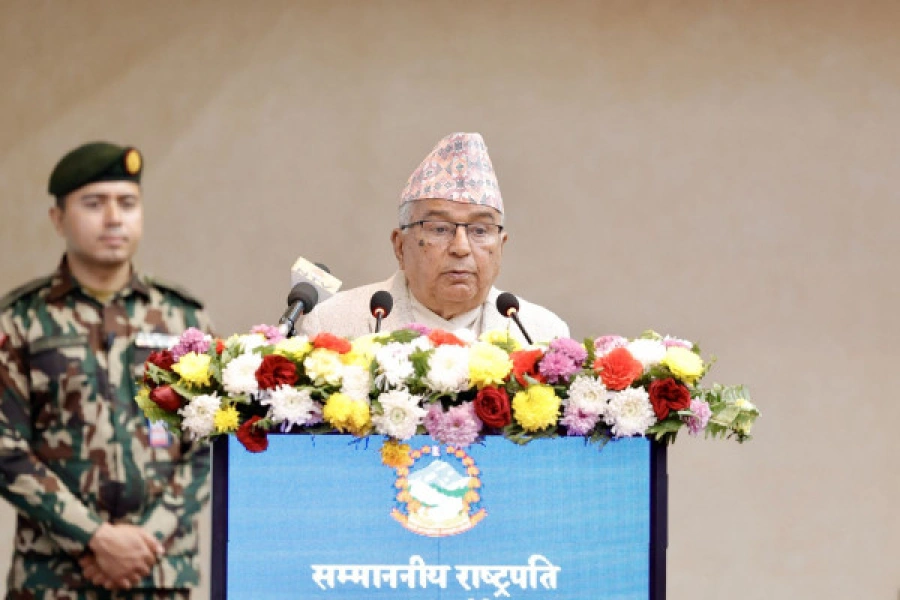BRI is not a “debt trap” but an “economic pie” that benefits local population. It is not a “geopolitical tool” but a great opportunity for shared development
At the invitation of Xi Jinping, President of People’s Republic of China, President Bidya Devi Bhandari will pay a state visit to China and attend the second Belt and Road Forum for International Cooperation and the opening ceremony of the 2019 International Horticultural Exhibition in Beijing from April 24 to May 2. This is the first state visit to China by Nepali President. During the second BRF from April 25 to April 27, President Bhandari will discuss plans for cooperation with leaders of China and other participating countries.
China and Nepal are neighbors linked by the Himalayas. Since ancient times, peoples of the two countries have crossed the Himalayas and established friendship that spans thousands of miles. The legend that Manjushri split the Kathmandu Valley is widely known in Nepal and the marriage of Nepali Princess Bhrikuti into Tibet is familiar to peoples of the two countries. As discovered by researchers, Master Xuanzang traveled to Nepal and said that “Nepal covers an area of more than 1200 miles in the snowy mountains” in his book Journey to the West in the Great Tang Dynasty.
Friends in need
China and Nepal established diplomatic relations in August, 1955. The two countries differ largely in land area and population, but always treat each other equally, respect and support each other and abide by the Five Principles of Peaceful Coexistence.
Criminalize conflict-era torture and enforced disapperaces: NHR...

China and Nepal are good neighbors with mutual political trust. The Nepali government firmly adheres to one-China policy and does not allow any anti-China activities on its soil. China always supports Nepal’s efforts to safeguard national independence, sovereignty and territorial integrity and Nepal’s social system and development path based on its own national conditions chosen by the Nepali people.
China and Nepal are good brothers sharing weal and woe. In April, 2015, Nepal suffered a devastating earthquake. The Chinese government and people felt the same grief and quickly dispatched multiple batches of rescue, epidemic prevention and medical teams, sent dozens of chartered flights of relief supplies, and participated in emergency rescue operations. The Chinese people spontaneously raised donations for the people in the disaster areas, and the Nepali people strove to help the trapped Chinese tourists out of danger and return to China as soon as possible.
China and Nepal are good partners for common development. Chinese companies are found working in Nepal’s post-disaster reconstruction areas, such as roads, airports, and power stations. According to Nepal’s statistics, China is Nepal’s biggest FDI country, the second largest trading partner and source of foreign tourists. The number of flights between two countries reaches almost 60 per week.
Significant times
The past 2018 has been a significant year for both China and Nepal. China’s reform and opening-up has gone through 40 years. During the 40 years, the Chinese people, under the leadership of the Communist Party of China, have forged ahead on the road to national development and progress through hard work. China’s GDP has averaged an annual growth rate of around 9.5 percent with per capita disposable income increasing from 171 Yuan to 28000 Yuan. In 2018, China’s GDP grew by 6.6 percent, exceeding 90 trillion Yuan and contributing over 30 percent to the global economic growth. In 2018, Nepal, after nearly 10-years of constitution-drafting process, successfully completed the three-level elections, formed a new government, and is moving toward a new stage of stable development.
The year 2019 marks the 70th anniversary of the founding of the People’s Republic of China. The “two sessions” recently concluded in China set new targets for the high-quality development of China’s economy, including maintaining GDP growth of 6-6.5 percent, creating over 11 million new urban jobs and reducing over 10 million rural poor population. China will continue applying the new development philosophy to keep major economic indicators within an appropriate range, sustain healthy economic and social development and celebrate the 70th anniversary of China with outstanding achievements. In 2019, the Nepali government has set grand development goals and is moving toward the goal of “Prosperous Nepal, Happy Nepali”.
China and Nepal are developing countries. Although we are at different stages of development, we all face the common task of making people live a better life. China’s development cannot be isolated from the world and vice versa. The economic and social development of countries in the world is increasingly interconnected. The reform of the global governance system and the international order is picking up speed. On the other hand, protectionism and unilateralism are resurging. Economic globalization faces headwinds, uncertainties and instabilities still abound, and risks and challenges are growing. By following the guidance of Xi Jinping Thought on Diplomacy, China will remain on the path of peaceful development, pursue mutually beneficial opening up, and resolutely uphold multilateralism and an open world economy. China will deepen relations with its neighbors including Nepal in accordance with the principle of amity, sincerity, mutual benefit, and inclusiveness and the policy of forging friendship and partnership with its neighbors. China stands ready to work together with all other countries to participate actively in reforming and improving the global governance system and build a community with a shared future for mankind.
BRI benefits
Reviewing the nearly six-year development of Belt and Road Initiative (BRI), it has proved that this great initiative is a new endeavor for China to integrate into the world and an important measure for building a community with a shared future for mankind. The BRI follows the sound principle of consultation and cooperation for shared benefits and has become the largest platform for international cooperation and the most welcomed global public good. The BRI is not a “debt trap” that some countries may fall into, but an “economic pie” that benefits the local population. It is not a “geopolitical tool” but a great opportunity for shared development.
Since China and Nepal signed the Memorandum of Understanding on Cooperation under the Belt and Road Initiative in May, 2017, the traditional friendly cooperation between China and Nepal has faced new historic opportunities. The leaders of the two countries have reached important consensus on jointly building the trans-Himalayan Multi-Dimensional Connectivity Network. On the basis of the principle of consultation and cooperation for shared benefits, the two sides respect each other’s core interests and major concerns, strengthen policy coordination and infrastructure connectivity, steadily push forward the construction and research of infrastructure development such as roads, ports, railways, and airports, promote the Joint Feasibility Study of China-Nepal Free Trade Agreement and the building of China-Nepal Cross-border Economic Cooperation Zone, enhance the level of trade facilitation, and strengthen the cooperation in tourism, finance, culture and people’s livelihood and push China-Nepal relations to a new height.
At present, China has entered a new era by following the path of socialism with Chinese characteristics, and Nepal also has opened a new chapter of stable development. We should seize the opportunities, actively develop win-win cooperation, combine the “Chinese Dream” of realizing national rejuvenation with the development goal of “Prosperous Nepal, Happy Nepali”, and join hands to embark on a new journey to benefit two peoples of the two countries and build a community with shared future for China and Nepal.
The author is Chinese ambassador to Nepal





































